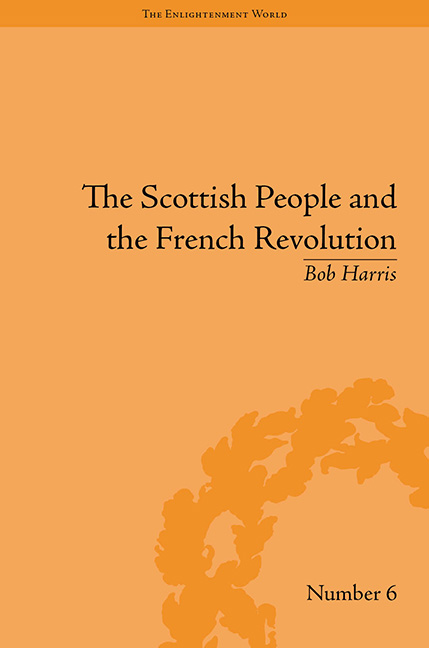Book contents
- Frontmatter
- CONTENTS
- Preface
- Introduction
- 1 The Eighteenth-Century Roots of Scottish ‘Jacobin’ Politics
- 2 Newspapers, the French Revolution and Public Opinion
- 3 ‘The True Spirit of Liberty’: Scottish Radicals, 1792–4
- 4 Checking the Radical Spirit
- 5 Volunteers, the Militia and the United Scotsmen, 1797–8
- 6 Bread, Dearth and Politics, 1795–1801
- Conclusion
- Notes
- Works Cited
- Index
Conclusion
- Frontmatter
- CONTENTS
- Preface
- Introduction
- 1 The Eighteenth-Century Roots of Scottish ‘Jacobin’ Politics
- 2 Newspapers, the French Revolution and Public Opinion
- 3 ‘The True Spirit of Liberty’: Scottish Radicals, 1792–4
- 4 Checking the Radical Spirit
- 5 Volunteers, the Militia and the United Scotsmen, 1797–8
- 6 Bread, Dearth and Politics, 1795–1801
- Conclusion
- Notes
- Works Cited
- Index
Summary
Scottish politics in this period can be seen as a variation on a common British narrative – one of radical weakness, divisions and failures and of loyalist and subsequently patriotic ascendancy – although what John Dinwiddy once termed the ‘Dickinsonian consensus’, after the seminal work on the period of H. T. Dickinson, has not gained universal acceptance. This book has presented much evidence which would support this portrayal of Scotland in the 1790s, but which also indicates some of its important limitations. It has also sought to focus attention, however, on the novel varieties of political experience in this decade, at various different levels of society. The issue of stability is unavoidable for historians of this decade, but preoccupation with it has on occasion squeezed other, equally compelling themes to the margins of historical debate.
It has been argued that in the case of Ireland the politics of the 1790s represented the culmination of a series of reforming and radical initiatives dating from the 1770s, if not slightly earlier. A similar argument has been made for England, although the connecting threads are not always as clear as they are sometimes represented, and the popular radicalism of the 1790s did represent something new in terms of its being a self-conscious attempt to usher into being a new type of politics involving a new class of citizen. In Scotland, the route to popular politicization was different, and 1792 appears to present an even sharper disjuncture in this context. The precocity of the eighteenth-century politicization of the ‘public sphere’ (to use Tim Blanning's formulation) was an English phenomenon, not a British one. Indeed, it is commonly argued that a precondition of the Enlightenment in Scotland was precisely this – the absence of political division and preoccupation with national politics after 1707. As we have seen (in Chapter 1), the case should not be overstated; but in broad terms Scottish political culture for the most of the eighteenth century had an intimacy, a close-knittedness, and a strength of focus on patronage and clientage which was unusual (but not unknown) in other parts of the British Isles.
- Type
- Chapter
- Information
- The Scottish People and the French Revolution , pp. 223 - 234Publisher: Pickering & ChattoFirst published in: 2014

